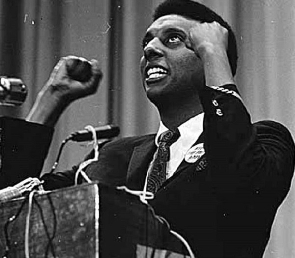 Kwame Ture is a US civil rights activist
Kwame Ture is a US civil rights activist
After the demise of Ghana’s first president Kwame Nkrumah, many who believed in him and his ideologies found various ways to remember the man that he was and what he especially stood for and against.
While there will always be some controversy surrounding some of his actions and deeds, it is safe to say Kwame Nkrumah was loved by many and resented by few.
Despite gaining independence for Ghana, Dr Nkrumah’s legacy can be found in various places and forms. For instance, his face was once embossed on the Guinean currency following his exile to the country and close relation to Guinea's first president, Sekou Toure.
In light of this and more, an African American civil rights activist, Stokely Carmichael went to the length of changing his name to reflect his belief in both Nkrumah and Toure’s ideologies.
Carmichael changed his name to Kwame Ture, a name that was derived from the first and last names of his close allies [Kwame Nkrumah and Sekou Toure].
According to blackpast.org, Kwame Ture was first born as Stokely Standiford Churchill Carmichael on 1941 in the Port of Spain, Trinidad.
From the age of 11, he rose to become a known activist while attending Bronx High School of Science, which was mostly attended by white students at the time.
Ture’s journey properly began when he attended Howard University and joined the newly formed Student Non-Violent Coordinating Committee (SNCC) in 1960.
During that time, he participated in SNCC sit-ins and Freedom Rides which were held throughout the Deep South in the USA at a time where human rights issues were rampant in an almost divided America. Kwame Ture was said to have led the campaign that established the Lowndes County Freedom Organization, a symbolic forerunner to the Black Panther Party.
In 1964, he graduated from Howard University along with other young SNCC activists. Ture however became increasingly frustrated with the movement’s reliance on white liberals and its advocacy of non-violent reform.
In his quest to make more progress in the fight for non-violent reform, Ture was elected to replace John Lewis as SNCC chairman, formalizing the shift in SNCC’s ideology.
During a 1966 march held in Mississippi, Kwame Ture first proclaimed the “Black Power” slogan which led to subsequent efforts to both define it and put it into practice.
The slogan turned him into a more established activist and media celebrity that championed the fight against government oppression and white nationalism.
The slogan “Black Power” however fragmented the liberal civil rights coalition of the 1950s and early 1960s but inspired subsequent groups such as the Black Panther Party which despite ideological disagreements, named Carmichael [Kwame Ture] as its Honorary Prime Minister in 1968.
Years on, Carmichael was said to have been a constant target by the FBI for intelligence, forcing him to move in 1968 to Ghana in West Africa and later Guinea by 1969. It was there that he adopted the name ‘Kwame Ture’ and began campaigning internationally for revolutionary socialist Pan-Africanism.
Ture then settled permanently in Conakry, Guinea where he died of prostate cancer in 1998. He spent his final decades denouncing U.S. racism and imperialism while working to build the All-African People’s Revolutionary Party.
It is said that he most likely chose the name Kwame Ture by naming himself after the Ghanaian and the Guinean independence leaders [Kwame Nkrumah and Sekou Toure] respectively.
MA/KPE